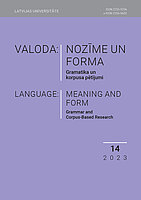Vārdkopas analogi „Latviešu valodas sintaktiski marķētajā korpusā”
Analogue of subordinate phrase in Latvian Treebank
Author(s): Laura Rituma, Gunta Nešpore-Bērzkalne, Baiba Saulite, Lauma PretkalniņaSubject(s): Morphology, Syntax, Lexis, Baltic Languages
Published by: Latvijas Universitātes Akadēmiskais apgāds
Keywords: Latvian syntax; syntactically annotated corpus; subordinate phrase analogue; compound part of sentence;
Summary/Abstract: The Institute of Mathematics and Computer Science, University of Latvia, has developed Latvian Treebank – a syntactically annotated corpus of the Latvian language. It showcases both the syntactical phenomena of the Latvian language already described in the Latvian syntax theory, as well as the less common structures that have not yet been analysed in depth by theory. This paper considers understanding of the subordinate phrase analogue in Latvian linguistics. The paper provides an overview of the constructions labelled as such in Latvian Treebank. The principles of a further classification of the subordinate phrase analogues by certain grammatical criteria (morphological composition and syntactical characteristics) and semantic criteria are proposed. Some analysis of the order of components in these compound constituents is also provided. The two most common types of the subordinate phrase analogues in Latvian Treebank are groups of pronouns, as well as constructions with prepositional phrases. Other types appear less frequently. The amount of treebank examples is sufficient to cover the lexeme variety used for each type, as well as the range of syntactical functions fulfilled by each type. Hereby developed criteria for identifying the analogues of subordinate phrase and consistent syntactical annotation provide a convenient language material for further analysis of these constructions.
Journal: Valoda: nozīme un forma
- Issue Year: 2023
- Issue No: 14
- Page Range: 156-173
- Page Count: 18
- Language: Latvian

